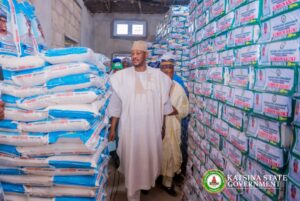Katsina State Government has launched a subsidized shopping programme, ‘Rumbun Sauki,’ designed to alleviate the economic hardships faced by workers, retirees, and the general public across the state.
The Governor launched the initiative on Wednesday, 5th March, 2025 in Katsina, the capital.
During the ceremony, Radda explained that the initiative directly responds to current economic challenges.
“The Rumbun Sauki Initiative—a project by the state government aimed at alleviating the hardships faced by our workers, retirees, and the general public. This initiative is a direct response to the rising cost of essential food items, providing much-needed relief to our communities,” the Governor stated.

He acknowledged the difficult economic circumstances affecting citizens, saying, “We are all aware of the economic challenges facing our nation and how these challenges directly impact the lives of our citizens. The soaring cost of food and other basic necessities has placed a significant burden on families, particularly government workers, pensioners, and students.”
The Governor also said, “As a responsible government, we cannot stand idle while our people struggle. The Rumbun Sauki Initiative is designed to ease these burdens by making essential food items—such as rice, maize, flour, and other staples—more affordable through a 10% subsidy.”
“Additionally, beneficiaries will have the flexibility to acquire these items on a loan basis, further easing financial strain,” Radda added.
“This initiative is a major investment, with the government committing ₦4 billion to ensure its success. Our goal is to enhance food security and economic stability across the state,” he revealed.
Radda also noted, “To guarantee fairness, accountability, and prevent any form of mismanagement, we have put in place strict mechanisms that will ensure the efficient distribution of these subsidized commodities. Beneficiaries—including state and local government workers, Local Education Authority staff, pensioners aged 60 and above, and other eligible citizens—will have access to these items, with a structured limit of one-third of their monthly earnings or pensions.”
“This approach ensures fairness, prevents hoarding, and guarantees that as many people as possible benefit from the program.”
“To kickstart this initiative, we are establishing seven distribution centers: three in Katsina, two in Daura, and two in Funtua. However, our vision extends far beyond these initial locations. As we monitor the implementation and impact of the program, we are committed to expanding Rumbun Sauki to cover all 34 local government areas of Katsina State.”
“This is just the beginning of a broader effort to strengthen food security, provide direct support to our people, and ensure that no citizen is left behind.”
In his final remarks to the citizens of Katsina State, Radda emphasized the purpose of the initiative, stating it is designed to support citizens during these difficult times and ensure that food remains within reach of every household. I urge all beneficiaries to make responsible use of this program, adhere to its guidelines, and support its sustainability. As a government, we remain committed to policies and programs that uplift our people, improve livelihoods, and create opportunities.
Earlier, the Deputy Governor Malam Faruk Lawal Jobe, reaffirmed the broader economic implications of the initiative, noting, “Beyond providing immediate relief, the economic impact of this program is substantial. Vendors participating in this initiative are expected to generate a minimum annual turnover of N30 billion, starting from the initial N4 billion investment.”
“As the program progresses, it will stimulate economic activities, create employment opportunities, and enhance wealth distribution across the state.”
In his opening remarks, the Special Adviser on Rural Economy, Engr. Yakubu Nuhu Danja, revealed the Governor’s vision for expanding the program’s reach. “Governor Radda has expressed his desire to expand this initiative over time to include non-formal sector citizens, particularly those above the age of 60, ensuring a broader reach of this support,” Engr. Danja stated.
The Special Adviser also detailed the financial arrangements available to beneficiaries. “Currently, beneficiaries will have access to subsidized food items up to one-third of their monthly earnings. They also have the flexibility to either pay upfront or opt for an interest-free loan, which will be deducted directly from their salaries at the end of each month,” he explained.
“This structure ensures ease of access while maintaining financial responsibility among the beneficiaries,” Engr. Danja concluded.










